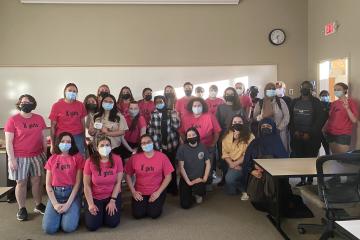
Broadening participation in economics, part two: The Kauffman Foundation on bolstering representation in research

J-PAL North America’s Economic Pathways work aims to expand access to the field of economics at every juncture in the professional pipeline, from high school to tenure. A similar effort was previously referred to as the Economics Transformation Project (ETP).
In the second post in our four-part series on the collaborations that shaped ETP, J-PAL staff spoke to Chhaya Kolavalli, a senior research officer at the Ewing Marion Kauffman Foundation, a donor of our work, on the importance of increasing representation in research.
What is the Kauffman Foundation’s mission, and how does your work on the research team contribute to the Foundation’s goals?
The Kauffman Foundation’s overarching goal is to prepare people for success in their jobs and communities and ensure that everybody has the opportunity to achieve economic stability. Within that goal, we have two main priorities: equipping the workforce with knowledge, skills, and experience; and supporting entrepreneur-focused economic development.
On my team—the research team—we support scholars and develop research on entrepreneurship and innovation. We aim for this research to be practical and actionable for communities in order to create systemic change.
For that research to be relevant to communities, it also needs to represent their needs and viewpoints. To ensure this, we also prioritize promoting inclusion in research by both promoting diverse researchers in entrepreneurship and including communities themselves within the research process. I specifically support diversifying the pipeline of scholars studying entrepreneurship through a portfolio of grants and by publishing reports on the value of diversity in research.
From your perspective, why is diversity in research so critical?
To me, it’s a moral imperative. We shouldn’t build and perpetuate and fund institutions that only include a small minority of voices. Exclusionary institutions are simply not able to adapt to the needs of a diverse society.
Lived experiences are also fundamental to high-quality research. Many, especially in STEM or economics, have an idea that research can be solely objective. But our lived experiences lead us to think differently from each other. Posing new research questions, thinking about different methods, all of that is valuable in research systems. We are missing out if that system is only made up of folks who think the same way, conduct research in the same way, and care about the same issues.
Diversity in research is particularly important in the context of economics. Economics is a core contributor to social policy. Economists are leaders in guiding public policy decisions around our country and around the world. That’s a large reason why my team was interested in supporting J-PAL North America’s Economics Transformation Project (ETP).
What stood out to you about ETP beyond its mission to broaden participation in the field of economics?
ETP targets its activities in the moments where a student might encounter a roadblock and leave the pipeline trajectory to becoming an economist. At Kauffman, we want to prioritize programs like these because they are a relatively low-lift intervention that consistently makes students feel more welcome.
It was also valuable to us that ETP was housed in a place like J-PAL, which has a high level of respect within the field of economics—J-PAL prioritizing diversity and inclusion is a signal to the rest of the field.
In addition, much of the pipeline work we’re supporting at Kauffman did not have the kind of rigorous evidence on their impact that we need to push conversations forward. It was important to us that ETP was looking to rigorously evaluate its program by the same methods J-PAL uses to evaluate other policies.
I also respected the commitment to constantly improving the design of the program so it was more effective, with input from students. The iterative process, the feedback loops that are built into the program, and the investment in understanding what works for communities are all unique and important.
What excites you about the opportunities that programs like ETP offer to students from backgrounds that are underrepresented in economics?
The work ETP is doing with high schoolers in dismantling the perceptions of who economics is for is incredibly important. ETP’s work makes research relevant to students’ lives, especially students of color, and explains what economics for social good is. Many people—including myself when I was choosing a career path—thought economics was about making money. But it can also be relevant to thinking about how to create healthy, safe communities. For students from underrepresented communities that witness disparities first-hand, this kind of work is often top of mind. The more students realize that this is a tool that is not only highly valued in our political sphere, but can be used to create change, the more likely they are to pursue a career in economics.
This post is the second in a four part series exploring the collaborative nature of J-PAL North America's Economics Transformation Project. The first post discusses the history of ETP and its overarching goals, the third post is a conversation with the Minnesota Center for Diversity in Economics on their pipeline and mentorship programs, and the final post summarizes the design of and research on mentorship programs in economics.
Related Content

Broadening participation in economics, part one: How J-PAL North America's collaborative high school program was built

Broadening participation in economics, part three: The Minnesota Center for Diversity in Economics on its history, impact, and pursuit of collaboration


